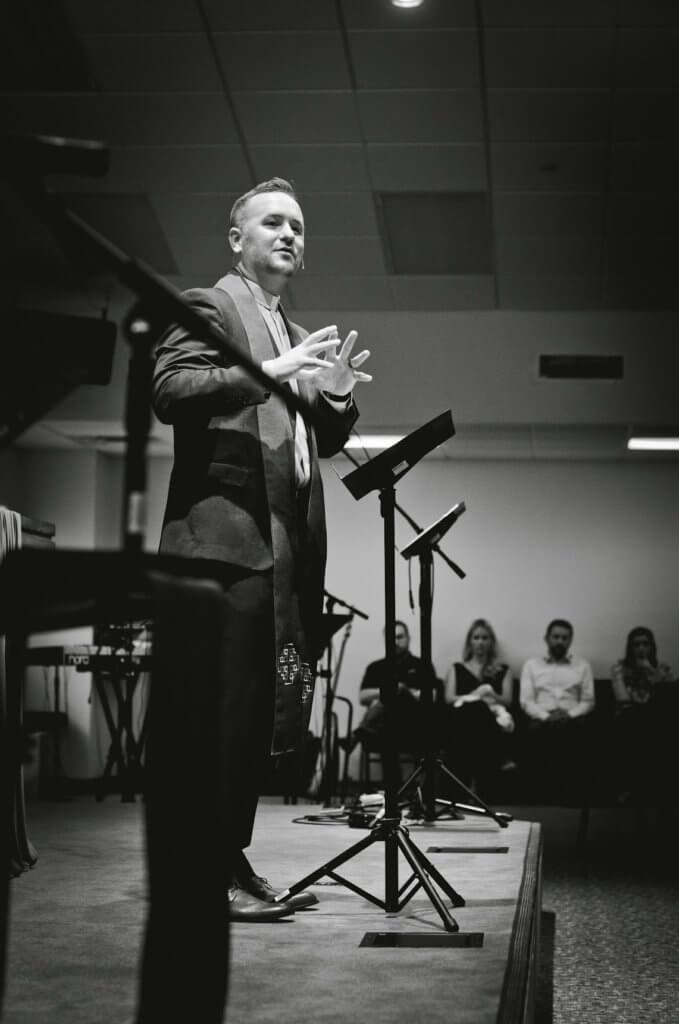by the Rev. Brian Pape
A leadership crisis arises early in the pilgrimage of God’s people from Egypt to the Promised Land. The crisis is unseen by Moses but clearly identified by Jethro, priest of Midian and father-in-law of Moses. Jethro’s name embodies the lesson.
Jethro = more than enough, abundance.
If Moses were to become the leader God destined him to be, he must learn to trust in God’s abundance in places of scarcity. Jethro’s name, presence, and coaching catalyze this pivotal shift inside of Moses.
For seventeen long chapters, the leader at the helm of the Exodus had seen God’s abundant provision for the people. They had been miraculously set free from slavery, delivered from the vast Egyptian military, delivered from other nations, given ample water and food in the desert, and the list goes on. But through Jethro’s coaching, Moses discovers what every leader must come to know deep down: God’s abundance is not just for them; He is also for me.
In Exodus 18, God demonstrates his abundant care and competency over the personal needs of the leader. It does not come to Moses like the manna which fell from heaven or like the water pouring forth from the rock. Instead, abundance comes as Moses releases real responsibility to real people who are right in front of him. Moses experiences God’s abundance by practicing the art of delegation.
The Problem: We often overfunction
If you read the job description of many church and nonprofit leaders, it’s easy to see the problem of over-functioning is baked into the system. We expect an awful lot of our leaders. Some churches expect the pastor to be all things to all people– from theological scholar, to superb preacher, to expert therapist, to gifted CEO/administrator, to even a witty political pundit/social activist. Disrupting such unhealthy expectations requires a shift inside the leader, the team around the leader, and the entire church culture.
To make matters worse, most of us leaders have a tendency to take on far too much responsibility for others than we should. This destructive combination of unrealistic expectations by the community and over-zealous appetites for responsibility by the leader is not just a modern phenomenon. It’s as old as Moses.
Because there is much work to be done, leaders who overfunction can forget there is also much to be thankful for. After hearing of “all the good things the Lord had done for Israel,” Jethro’s visit is an opportunity to celebrate, worship, and feast with Moses. Then, he spends the next day or two simply observing a typical day in the life of the leader.
Over 600,000 men have joined Moses on the other side of the Red Sea. This means the “people of Israel” number in the millions once you account for the extended family. Can you imagine the demands and concerns of such a community? What an overwhelming burden. How does one leader meet the needs of all these people? He burns the candle at both ends. We are told Moses listens and offers counsel to the people “from morning till evening.”
If there was a problem among anyone in Israel, Moses was the man to see. When Jethro inquires about why the current reality is so centered upon one person, Moses answers candidly, “Because the people come to me to seek God’s will.” (Exod. 18:15) Sounds like Moses has mistaken the personal call of God to mean he must bear all of the burden alone. Every spoke of the wheel made its way back to a single hub: Moses.
This is what psychologists might refer to as “enmeshment.” Boundaries have become unclear. Moses is stuck in the weeds of everyone else’s needs. He loses perspective. He is so busy meeting the needs of others— so “in it” that he is not able to “see it.” This is common in the church today. It is the mistake of assuming one’s calling to ministry equals meeting whatever needs arise. Moses had been reduced to what Stanley Hauerwas calls most pastors today: ‘a quivering mass of availability.’
What is the problem with such overfunctioning by the leader? It wears everybody out! Even though the leader is always busy, legitimate needs still go unmet– especially the needs of the leader. Nobody wins. Those closest to Moses were able to see: this is not sustainable. Everyone’s edges had quickly started to fray. Can you imagine the line ups or as the Brit’s say ‘que’, to get an appointment with Moses? What a waste of people’s time. Nobody can exercise judgment for their life and their context until Moses says it is acceptable. What a way to create codependency, inertia, and of course burnout in Moses and his support staff.
We don’t know how close Moses was to burnout. What we do know is God provided a person or two that loved Moses more than the work itself— and helped him gain perspective through the same method we are utilizing in this book. Jethro asks critical questions that propel Moses forward. After listening to his responses, and in remarkable efficiency, Jethro simply says, “the thing you are doing is not good.” Check out Jethro’s full response in Exodus 18:17-23.
Moses’ overfunctioning was a serious matter. It had the potential of not only crushing him but also the health of the entire community. “The thing you are doing is not good,” is a hard truth to hear for the weary leader who is trying so hard to do so much good. Moses has the humility to listen to Jethro’s proposal to make a move: from me to we. To make this move, Moses must first overcome his own internal barriers to delegation. I’ve yet to observe a pastoral leader that didn’t struggle, on some level, with making the same move.
In my own personal experience as a pastor and in my work with leaders, I have identified some of the most common psychological barriers to delegation. The phrases below are rarely spoken aloud, but when we have the courage to face the roadblocks inside, they sound something like this:
- The presence of pride: “I can do this better than anyone else, so I better do it myself.” Or, “I can do this faster than anyone else, so I better do it myself.” This preoccupation with perfectionism or efficiency is an indicator of the presence of pride.
- The absence of trust: “I don’t know if I can trust the other leaders around me with this responsibility.” or “I simply don’t have capable people on the team.”
- The fear of losing control: What if they don’t do a good job? What if we flop? What if the leader(s) and/or community stop looking to me for answers?
- The need to be the hero: What if they do a good job and I don’t get all the credit?
- A negative understanding of delegation: “I don’t want to be a burden to others.” Instead of seeing delegation as a way of developing other leaders and maturing the whole organization, we mistakenly see delegation as the dumping of mundane tasks, abdicating responsibility, etc.
- The presence of burnout: “I’m just too weary to pass along responsibility.” Even in the early stages of burnout, a leader can get overwhelmed with the tyranny of the urgent and no longer see the opportunity for abundance found in teamwork.
- The tyranny of the urgent: “I don’t have time to delegate. The project will get done faster if I do it myself.” You’ve heard the saying, “old habits die hard.” For leaders who have cultivated the habit of overfunctioning, it can be difficult to imagine taking the time to get out from under the tyranny of the urgent.
We do not know which of the barriers were present in Moses, but one thing is clear, he simply did not see delegation as an option without the intervention of Jethro. This should be encouraging news. Moses is the only leader in the Old Testament described as one “whom the LORD knew face to face.” (Deut. 34:10) If he had a leadership blind spot, then there is hope for the rest of us to make the move from me to we.
Have you and the team around you made this move? Or are you stuck in the early part of Exodus 18 like Moses– overfunctioning as you meet the needs of everyone else “from morning till evening?” Eventually, you or the people around you will hit a wall of chronic weariness and frustration. You might have heard the proverbial saying, “if you want to go fast, go alone. If you want to go far, go together.” Going alone isn’t a viable option for leaders who have been called to sojourn with God’s people.
In the next article on the move from me to we, I’ll explore two false substitutes for delegation every leader faces. Then, we will consider how to embrace God’s abundant provision for our leadership needs.
About the Rev. Brian Pape

Brian is a graduate of Angelo State University and Duke Divinity School. After completing his business and theology degrees, he was ordained as a priest in 2014. Brian has been married to Dr. Jennifer Pape for 21 years and they are the proud parents of two children, Tucker and Emery. He previously served as a Rector for 8 of his 20 years of ministry experience and currently serves as Senior Consultant for the AAC’s Anglican Revitalization Ministries.


